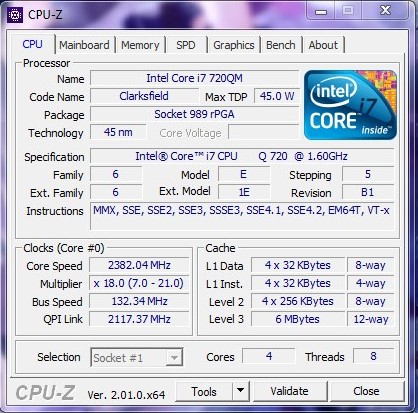Comparing: Intel Core i7 720QM vs Intel Core i5 1335U
In this comparison, we analyze two Processors: Intel Core i7 720QM and Intel Core i5 1335U, using synthetic benchmark tests to evaluate their overall performance. This side-by-side comparison helps users understand which hardware delivers better value, speed, and efficiency based on standardized testing. Whether you're building a new system or upgrading an existing one, this benchmark-driven evaluation offers valuable insights to guide your decision.
Specification Comparison Table
This specification comparison presents technical details of several devices or components to help you understand the key differences between each option. Use this table as a reference to determine which device best suits your needs.
| Specification | Intel Core i7 720QM | Intel Core i5 1335U |
|---|---|---|
| Architecture | x86 | x86 |
| Technology | 45 nm | 10 nm |
| Clock | 1.6 GHz - 2.8 GHz | 1.3 GHz - 4.6 GHz (P), 3.6 GHz (E) |
| Core/Thread | 4 / 8 | 10 (2P + 8E) / 12 |
| Segmen | Mobile | Mobile |
Submission Comparison Table
This submission comparison table displays the number and details of benchmark data submissions from various devices or components. This information helps you understand the performance based on the benchmarks that have been tested, as well as providing an overview of the consistency and popularity of the available benchmark results.
| No. | Benchmark Software | Intel Core i7 720QM | Intel Core i5 1335U |
|---|---|---|---|
| 1 | 7-Zip |
10448 MIPS |
52680 MIPS |
| 2 | Cinebench - 2003 |
1211 cb |
6677 cb |
| 3 | Cinebench - R11.5 |
2.71 pts |
19.45 pts |
| 4 | Cinebench - R15 |
220 cb |
1350 cb |
| 5 | Cinebench - R20 |
527 pts |
3066 pts |
| 6 | Cinebench - R23 Multi Core with BenchMate |
1024 pts |
8031 pts |
| 7 | Cinebench - R23 Single Core with BenchMate |
301 pts |
1611 pts |
| 8 | Geekbench3 - Multi Core |
4158 points |
31332 points |
| 9 | Geekbench3 - Single Core |
1078 points |
6182 points |
| 10 | Geekbench4 - Multi Core |
4457 points |
31691 points |
| 11 | Geekbench4 - Single Core |
1420 points |
7387 points |
| 12 | Geekbench5 - Multi Core |
917 points |
8114 points |
| 13 | Geekbench5 - Single Core |
282 points |
1698 points |
| 14 | PCMark10 |
1138 marks |
5377 marks |
| 15 | PiFast |
34sec, 20ms |
13sec, 990ms |
| 16 | SuperPi - 1M |
16sec, 52ms |
7sec, 92ms |
| 17 | wPrime - 32M |
16sec, 279ms |
3sec, 985ms |
| 18 | wPrime - 1024M |
8min, 13sec, 257ms |
3min, 3sec, 230ms |
| 19 | y-cruncher - Pi-25m |
12sec, 665ms |
1sec, 61ms |
Submission Comparison Chart
This chart visualizes the benchmark scores comparison between two hardware devices based on submitted data.
Media Gallery
A collection of photos of tested hardware. These images can help you identify the physical form, model, and variant of the hardware in question. These photos are from our own documentation, and if they are not available we may not be able to document them.
About Hardware Intel Core i7 720QM
The Intel Core i7-720QM, launched in Q3 2009, was one of the first mobile quad-core processors to feature Intel's Nehalem microarchitecture, specifically the Clarksfield variant. Targeted at high-performance laptops, such as gaming machines and mobile workstations, the i7-720QM brought 4 physical cores and 8 threads to the mobile platform, thanks to Hyper-Threading Technology providing a significant boost in multi-threaded workloads like video editing, 3D rendering, and other professional-grade applications. The processor runs at a base clock speed of 1.6 GHz, but it can dynamically increase up to 2.8 GHz using Intel Turbo Boost, depending on thermal headroom and power availability.
Manufactured using a 45nm process, the i7-720QM has a TDP of 45W, which is quite high by today's mobile CPU standards. This thermal demand necessitated more robust cooling solutions in laptops that featured the chip. Unlike modern CPUs, the i7-720QM does not come with integrated graphics, which means systems based on this processor require a dedicated GPU often from AMD or NVIDIA for graphics processing and display output. As such, it was typically paired with mid-to-high-end discrete graphics cards in its time, making it a solid choice for gaming and multimedia laptops in the late 2000s and early 2010s.
While the Core i7-720QM was a powerhouse during its release, its performance and efficiency are significantly outpaced by modern CPUs built on smaller nodes and with higher IPC (Instructions Per Clock). Nevertheless, legacy laptops using the i7-720QM can still be viable for basic computing tasks like web browsing, document editing, or watching videos especially if paired with an SSD upgrade and increased RAM. Users running Windows 10 on such systems may experience some limitations, but with proper optimization and lightweight software, the CPU can still deliver a usable experience in non-demanding environments.
Hardware Detail:
Device: HP Pavilion dv3-4054TX
RAM: 4GB DDR3 Single Channel
OS: Windows 7, Windows 10
Tuesday, 19 July 2022 19:48:49 | Update: 1 month ago
About Hardware Intel Core i5 1335U
The Intel Core i5-1335U is a mobile processor from the Raptor Lake family, launched in 2023 and aimed at thin-and-light laptops such as ultrabooks. This processor offers a 10-core hybrid architecture, consisting of 2 Performance cores (P-cores) and 8 Efficiency cores (E-cores), delivering a total of 12 threads to handle both heavy workloads and background tasks efficiently. With boost clock speeds up to 4.6 GHz on the P-cores, the i5-1335U provides excellent responsiveness for productivity, multitasking, and modern office applications.
Built on Intel 7 (10nm Enhanced SuperFin) process technology, the i5-1335U maintains a base TDP of 15W, making it suitable for long battery life and efficient thermal management in slim devices. For graphics processing, the integrated Intel Iris Xe Graphics delivers capable performance for video playback, creative work, and casual gaming, especially when paired with dual-channel memory configurations.
The i5-1335U is featured in devices like the Acer Aspire 5 A515-58P, which includes 8GB LPDDR5 RAM (non-upgradeable) and runs on Windows 11 22H2, offering a modern, smooth user experience. Overall, the Core i5-1335U is an ideal choice for students, professionals, and mobile users looking for a balance between performance and energy efficiency in daily computing.
Hardware Detail:
Device: Acer Aspire 5 A515-58P
RAM: 8GB LPDDR5 (Fix, Cannot Upgrade)
OS: Windows 11 22H2
Tuesday, 15 August 2023 13:16:48 | Update: 1 month ago





